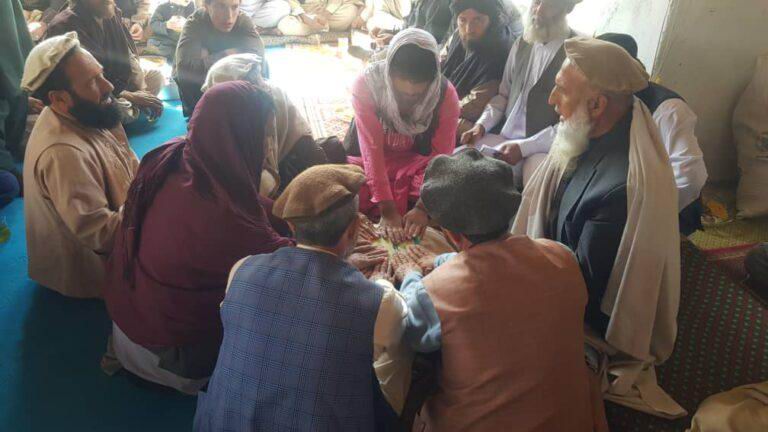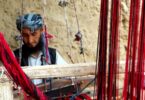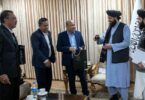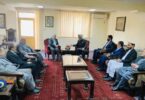MEHTARLAM (Pajhwok): A 45-year-old feud between two families in of the Dawlat Shah District of eastern Laghman province has finally come to an end.
They had inherited from their ancestors the enmity that claimed eight lives, Mohammad Shah, 55, said on Monday. The families reconciled and pardoned each other as a result of talks.
About the bitter story of his past life, Shah told Pajhwok Afghan News he was 13 when his father had a dispute over land with a man named Sala Khan. In the ensuing enmity, eight people from the two sides lost their lives.
During the enmity lasting 45 years, he said, members of both families carried guns, suffered psychiatric diseases and lived in grief.
In order to come out of that miserable situation, both parties authorised tribal elders to resolve their long-running feud. The two sides pardoned each other and their feud turned into friendship after peace negotiations on March 16 2023.
Many believe squabbles, verbal clashes and other reckless incidents lead to enmities that claim the lives and joys of the parties involved. They agree such enmities are eventually resolved through talks.
But the question is: Why don’t people resort to the final measure (talks and pardon) in the first place?
The answer to this question should be searched in Shah’s statement.
Shah believes if his father and the other side had exercised patience at that time, eight people would not have lost their lives. Their heirs would not have inherited hostilities, he says.
Shah recalled: “I was 13 years old when my father pushed himself and his family into the trap of enmity. For years, we lived away from our village house. We were scared even of our own shadows. All of members of my family suffered from psychiatric disorders and never felt secure.”
Because of the 45 years long feud, both families suffered casualties and their children were deprived of education, he lamented.
At long last, Shah said, he decided to sit down for talks with the other party and he succeeded in doing so. The enmity between the families was resolved with the help of religious scholars and tribal elders.
He added: “I lived abroad for many years — away from home. Once I asked myself how long we will continue to live miserably. How long will we be aiming our guns at each other? After thinking for a long time, I picked up my phone and called tribal elder Malik Haidar Khan to save us from this agony.”
Haidar Khan shared the issue with other tribal elders and religious scholars, who subsequently consulted the rival party.
Mohammad Omar, an elder from the other party, also expressed pleasure over the end of the enmity. He said they were no longer haunted by safety concerns.
Mohammad Omar commented: “I regret living for 45 years with this feud. We cannot bring back the time that has passed. Our families and children have immensely suffered and we ask all people to save themselves from the agony of enmities,”
Omar confirmed pardoning the killers of his relatives for God’s sake and in response to pleas from tribal elders for ending the enmity.
He remarked: “The biggest affliction on earth is enmity. We have suffered a lot of losses. Eighteen of our houses have crumbled and we lost members of our families. Now we have returned to a normal life and live in peace.”
He called for people to steer clear of enmities because every moment of life in enmity was full of concerns.
Malik Haidar Khan, a mediator, told Pajhwok: “It was 45 years ago when Zarif Shah and Sala Khan clashed over a land dispute in Dara Took area. During the four and half decades of enmity, eight members of their families were killed.”
At the beginning of the feud, Sala Khan was killed. In revenge, members of the victim’s family killed four people from the rival family.
Tribal elders and religious scholars had mediated between the families at that time, asking both to stop attacks.
However, after 17 years, some members of Zarif Shah’s family killed three relatives of Sala Khan, making the enmity more complicated, Haidar explained.
Ha added the mediators, authorised by the rival households, had sorted out the enmity. Both sides are now living in peace, according to him.
Religious scholar Maulvi Abdul Rasheed, a mediator, said: “The jirga has decided Mohammad Shah, son of Mohammad Rasool will pay 250,000 afs in compensation to Mohammad Omar. The payment has already been made. Now members of both families must live as brothers. Any of the parties violating this decision will be expelled from the village and all of its properties and belongings will be given to the other side.”
Qari Abdul Qahir Mutawakil, the district governor and mediator, confirmed the conflicting families had asked him for mediation between them.
He said the jirga had received written guarantees from both families not to harm each other in the future.
Public figures and civil activists want enmities to be resolved at the initial stage. If allowed to linger on, disputes can create disorder and problems in the community, they argue.
Maihan, headmaster of a Mehtarlam school, opined all conflicts could be resolved through discussions.
He urged people to be careful even on small issues and prioritise talking out their problems.
He stressed authorities and tribal elders must push ahead with efforts for ending tribal disputes to enforce order in society.
According to information from the district administration, 41 feuds have been patched up in Dawlat Shah with mediation from tribal elders and religious scholars since the Islamic Emirate’s takeover.
Attempts at ending such long-running enmities in different parts of the country have gained momentum over the past one year and a half.







